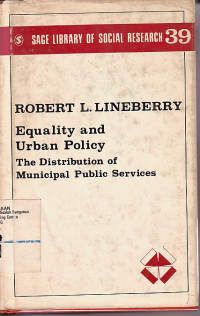
Textbook
Equality and Urban Policy: The Distribution of Municipal Public Services Volume 39
This book is concerned with what I take to be a fundamental, but much-neglected, problem in the study of urban politics: What city governments do with their money and who gets the benefits of urban policy. While the focus is on a single city, the issues raised are general, and only a small part of the book is consumed analyzing case-study data. The problems I discuss-service alloca tion and discrimination, the relationship between power structure and policy, the legal and operative standards for equality in urban policy, and bureaucratic monopoly in service delivery-are general ized issues in city politics. I hope that the effort here will consti tute an opening of inquiry beyond the analysis of expenditures alone, and toward their distribution. There is more to urban policy than a budget. Behind that budget lurks the people who spend it and the consumers who receive its purchases of goods and services. I am indebted to more people than I can name, particularly keepers of urban data who almost universally made them available. In particular, though, for advice, counsel, or assistance at various stages, I am indebted to Steve Yeager, Susan Knight,· Rơd Welch, Jane Macon, Angela Agee, and Patsy Taylor. The National Science Foundation provided financial assistance for the collection and analysis of data reported herein, but naturally bears no responsi bility for my interpretation. Both my wife Nita, and Rhoda Blecker at Sage have exhibited the supreme virtue of patience.
Ketersediaan
| 0000006503 | 352.073 LIN e | Library Pusperkim | Tersedia |
Informasi Detail
- Judul Seri
-
Sage Library Of Social Research
- No. Panggil
-
352.073 LIN e
- Penerbit
- Baverly Hills : SAGE., 1977
- Deskripsi Fisik
-
205 hal.; ilus; 14,2 x 22,3 cm.; indeks.
- Bahasa
-
Inggris
- ISBN/ISSN
-
O-8039-0742-7
- Klasifikasi
-
352.073
- Tipe Isi
-
text
- Tipe Media
-
-
- Tipe Pembawa
-
-
- Edisi
-
Ed. 1, Cet. 1
- Subjek
- Info Detail Spesifik
-
-
- Pernyataan Tanggungjawab
-
-
Versi lain/terkait
Tidak tersedia versi lain
Lampiran Berkas
Komentar
Anda harus login sebelum memberikan komentar
 Karya Umum
Karya Umum  Filsafat
Filsafat  Agama
Agama  Ilmu-ilmu Sosial
Ilmu-ilmu Sosial  Bahasa
Bahasa  Ilmu-ilmu Murni
Ilmu-ilmu Murni  Ilmu-ilmu Terapan
Ilmu-ilmu Terapan  Kesenian, Hiburan, dan Olahraga
Kesenian, Hiburan, dan Olahraga  Kesusastraan
Kesusastraan  Geografi dan Sejarah
Geografi dan Sejarah